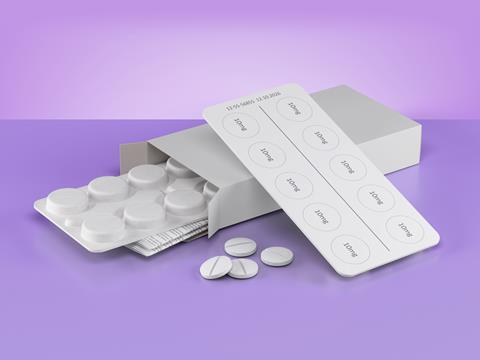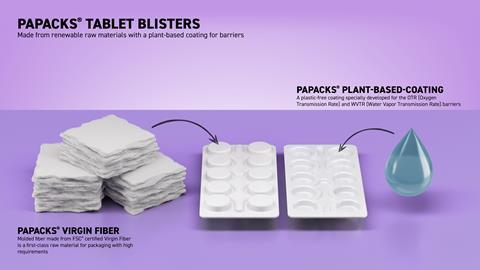
Next in our Finalist Interview series for the Sustainability Awards is PAPACKS with its tablet blister made from ‘renewable raw materials with organic coating’. We spoke to PAPACKS about this entry, which has been nominated in the pre-commercialized renewables category.
You’re a finalist in the Sustainability Awards 2023. Congratulations! To start off, could you summarise your entry, in less than 50 words?
A groundbreaking, eco-friendly packaging solution for pharmaceutical and over-the-counter products. Our blister is made from renewable materials, replaces aluminum foil with recyclable paper and is coated with a plastic-free plant-based coating, to provide a protective barrier for tablets. With this, we eliminate single-use plastic and aim to reduce environmental impact.
Why do you think the judges were impressed with your entry? Tell us about what is innovative about your project and/or about its impact on packaging sustainability.
We think that the judges were highly impressed with our entry for several reasons. Firstly, our fibre-based tablet blister addresses a critical issue in the pharmaceutical packaging industry by providing a sustainable alternative to single-use plastic.
In addition, our use of renewable raw materials, such as FSC®-certified virgin fibres, showcases our dedication to sustainable sourcing and forest conservation. This aligns with the growing demand for eco-friendly practices in packaging.
Furthermore, we assume that the integration of the PAPACKS® Plant-Based-Coating is another key aspect that caught the judges’ attention. By developing a specialized plant-based coating, we were able to achieve grease, oxygen, and water vapour resistance for our moulded pulp products. This breakthrough technology provides the necessary protective barrier for pharmaceutical products, ensuring their quality while eliminating the need for plastic.
Overall, we are convinced that our entry impressed the judges due to its combination of innovative design, commitment to sustainability, and quantifiable positive effects. We are proud to have been recognised as a finalist and look forward to further advancing packaging sustainability in the industry.
When and how do you intend to launch/commercialize this innovation?
We are well-prepared for the launch and commercialization of our tablet blisters made from renewable raw materials with a plant-based coating. The foundational structure, comprising renewable fibres and a plant-based coating, has undergone thorough testing and has successfully met our requirements.
Given the need for specific packaging specifications in the pharmaceutical and OTC industry, tailored to individual product requirements, we need a strategic partner to collaborate with us in bringing this product to market. We believe that partnering with an industry leader will not only provide us with valuable expertise but also help us navigate regulatory processes and ensure seamless integration into existing supply chains.

You’re shortlisted for the pre-commercialized category for Renewable Materials. What do you see as the key demands and challenges in relation to developing new materials from renewable feedstocks for packaging applications?
The key demands and challenges in developing new materials from renewable feedstocks for packaging applications are multifaceted. Firstly, there is a need for materials that can match or surpass the performance of conventional materials such as single-use plastics in terms of durability, barrier properties, and product protection. Achieving this balance between sustainability and functionality is a crucial challenge.
Another challenge lies in ensuring a consistent and reliable supply of renewable feedstocks to meet the growing demand for sustainable packaging materials. This requires establishing efficient supply chains, fostering collaborations with raw material suppliers, and promoting sustainable sourcing practices.
Additionally, the scalability and cost-effectiveness of renewable materials pose challenges. It is important to develop manufacturing processes and technologies that can be implemented on a large scale while remaining economically viable.
Furthermore, regulatory compliance and certification play a significant role in the adoption of renewable materials for packaging. Meeting industry standards, certifications like FSC®, and proving the sustainability claims through reliable data and testing are essential for gaining trust and acceptance from stakeholders.
In pursuit of these approaches, we are already implementing a transition in our raw materials. In the near future, we will produce our packaging products from domestically grown industrial hemp. To ensure raw material independence and higher supply reliability, we have secured 2,000 hectares of cultivation land in Ukraine.
Industrial hemp serves as a rapidly renewable resource, offering a significant contribution to sustainability. During growth, industrial hemp absorbs substantial amounts of carbon dioxide (CO2) from the atmosphere, actively reducing greenhouse gas emissions and combating climate change. Additionally, industrial hemp is highly adaptable and requires less water compared to many other crops, making them an environmentally friendly and resource-efficient alternative.
Overall, developing new materials from renewable feedstocks for packaging applications requires addressing performance, supply chain, scalability, cost, and regulatory challenges. Overcoming these hurdles will contribute to a more sustainable and environmentally friendly packaging industry.
What do you think are the main opportunities in this area or what future innovations do you predict in this area?
The field of sustainable packaging for pharmaceutical and OTC products presents numerous opportunities for innovation and future advancements. Looking ahead, future innovations in this area may involve further enhancing the performance and sustainability of resealable containers for pharmaceutical and OTC products.
By leveraging our technology and expertise, we have successfully created resealable containers that are entirely plastic-free. Building upon the principles used in our tablet blister, we employ the PAPACKS® Plant-Based-Coating to provide a protective barrier for the can’s interior. This coating ensures the preservation and integrity of the packaged products.
In terms of manufacturing, our specialised production processes enable us to create screw threads from moulded pulp, eliminating the need for plastic in the container’s neck. This innovative approach not only eliminates plastic waste but also maintains the functionality and convenience of traditional resealable cans.
Overall, the main opportunities in this area revolve around expanding the range of sustainable packaging options, enhancing functionality and performance. By embracing these opportunities and driving innovation, we can continue to meet the evolving needs of the pharmaceutical and OTC packaging industry while reducing environmental impact and promoting a more sustainable future.
The winners of the Sustainability Awards 2023 will be announced at the Sustainable Packaging Summit, which takes place in Amsterdam on 14-15 November. The Summit mobilizes leaders of the FMCG value chain, policymakers, NGOs, recyclers and investors to collaborate, remove barriers and identify opportunities on the road to sustainable transformation.
To learn more or register, visit https://www.packagingsummit.earth/amsterdam2023/.














No comments yet